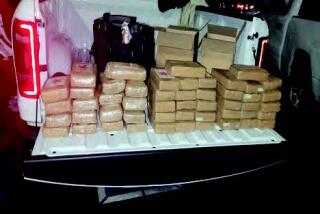U.S. Officials Announce 2 Terrorism Indictments
- Share via
WASHINGTON — Government prosecutors unsealed two indictments Wednesday alleging that terrorists tried to use drug sales to finance weapons purchases, including one in San Diego that charges three men with plotting to buy Stinger missiles intended for the Al Qaeda network.
The Justice Department asserted that the two cases bolster its conviction that drug profits are helping to finance global terrorism.
The three men indicted in San Diego -- two Pakistanis and an American from Minneapolis -- were arrested Sept. 20 and are being held by Chinese authorities in Hong Kong, pending an extradition hearing next week, Justice Department officials said Wednesday.
The other indictment was brought in Houston against four alleged members of a right-wing Colombian paramilitary group, the United Self-Defense Forces of Colombia, or AUC, accusing them of trying to negotiate a deal for five shipping containers of weapons in exchange for cash and cocaine.
“This multimillion-dollar cocaine-for-arms deal is yet another example of the convergence of violence and terrorism with drug trafficking,” Drug Enforcement Administration chief Asa Hutchinson said Wednesday. “We have demonstrated that drug traffickers and terrorists work out of the same jungle, they plan in the same cave and they train in the same desert.”
Atty. Gen. John Ashcroft, however, declined to say whether the three men in the San Diego indictment were linked to Al Qaeda or known drug traffickers.
Ashcroft and Hutchinson, along with FBI Director Robert S. Mueller III, spoke at a high-profile news conference in Washington but released few details about the two investigations.
The San Diego indictment alleges that meetings between the three suspects and FBI undercover agents, who conveyed that they had Stinger missiles, began around April 11 in San Diego. By Sept. 18, the indictment alleges, the three had met with FBI agents at a Hong Kong hotel to sell 1,320 pounds of heroin and 5 tons of hashish for four Stinger missiles.
The three men said that “they intended to sell the Stinger antiaircraft missiles ... to members of the Taliban, an organization which the defendants indicated was the same as Al Qaeda,” according to the indictment.
Stinger missiles are a shoulder-fired antiaircraft weapon developed by the Army. The deal-making was caught on videotape in Hong Kong, and law enforcement authorities in the Chinese territory assisted in the arrests, Ashcroft said.
The San Diego indictment names two men from Peshawar, Pakistan: Syed Mustajab Shah, 54, and Muhammed Abid Afridi, 29. Also named is Ilyas Ali, 55, of Minneapolis. No details about the men, any criminal histories, any links to terrorist groups or their role in the drug business were released. Terrorism experts contacted by The Times said the men were not recognized terrorists.
“If they were big fish, we would know,” said Juliette Kayyem of the Kennedy School of Government at Harvard University and a former member of the National Commission on Terrorism.
The more detailed Houston indictment alleges that four AUC officials negotiated with undercover FBI and DEA agents in Panama to buy 9,000 assault rifles, submachine guns, sniper rifles, 300 pistols, rocket-propelled grenade launchers, 300,000 grenades, shoulder-fired missiles and about 60 million rounds of ammunition. The men were offering to pay $25 million in cash and cocaine for the shipment, the indictment alleges.
The U.S. attorney’s office in Houston described the AUC as an umbrella organization that consolidated local and regional paramilitary groups in Colombia. The group, Colombian authorities allege, has conducted 804 assassinations and “75 massacres with 507 victims.” The State Department has listed the group as a terrorist organization.
The four men named in the indictment are Uwe Jensen, 66, and Carlos Ali Romero Varela, both of Houston; Cesar Lopez; and an individual identified only as Commandant Emilio. Jensen was arrested Tuesday in Houston, and the three others were taken into custody in Costa Rica on Tuesday after a final meeting with undercover U.S. agents.
Although the Bush administration has made a strong case that terrorism is closely linked to drug dealing, outside terrorism experts are more cautious in making that link. For example, a recent report by the Council on Foreign Relations on the financing of terrorist organizations hardly mentioned the drug trade.
Kayyem said that terrorist organizations historically have sought to draw as little attention as possible and generally have raised the bulk of their money from charitable fund-raising, government sponsorship and legitimate enterprises.
“Why would you want to support one criminal activity with another criminal activity?” she said.
“If you get caught with one, it may disclose the other.”
But Bruce Hoffman, a terrorism expert at the Rand Corp. think tank in Santa Monica, said there is evidence that terrorist groups are deep into the drug trade, noting that the ousted Taliban regime in Afghanistan used drug cultivation to support itself and that as the U.S. increases its pressure on funding sources for terrorist groups, the groups are seeking to develop drug businesses.
More to Read
Sign up for Essential California
The most important California stories and recommendations in your inbox every morning.
You may occasionally receive promotional content from the Los Angeles Times.











